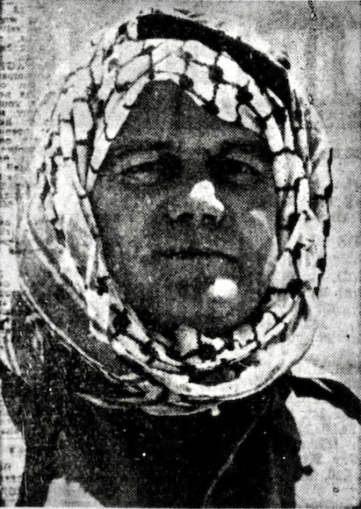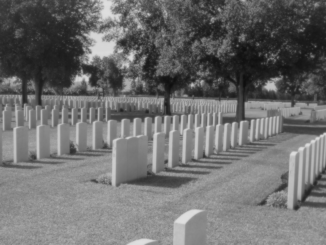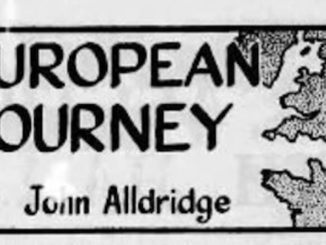In 1961 my uncle, John Alldridge spent some time on the set of Lawrence of Arabia and reported his experiences for the Birmingham Mail – Jerry F

Newspaper article header, Birmingham Mail,
Unknown photographer – © 2022 Newspapers.com, reproduced with permission
Jebel Tubeiq, in the desert
I’ve done some odd things in my life. But never have I eaten a shrimp cocktail in the middle of a desert with the temperature at 100 in the shade and still rising.
It happened this way…
I had been kicking my heels in the base camp at Akaba for two days, waiting for a lift out into the desert, when somebody suggested it might be a good idea if I went all the way back to Amman and picked up a truck going as far as Ma’an (where “Lawrence of Arabia” had been shooting now for a week).
This was like going from Land’s End to John O’Groats by way of Beachy Head.
But since I was the guest of a film company working on an apparently limitless budget with time and money no object, it would have been churlish to object.
So we loaded up with innumerable bottles of water and a stack of sandwiches that soon turned bone-hard in the heat, and started off back to Amman.
Forty years ago it took Lawrence and his Arabs many weeks to cover those 400 miles from the capital to the sea. Now a fine new desert highway, laid down by American engineers, makes the trip possible in under six hours at an average of 70 miles an hour.
It is a spectacular ride, this: through desolate moon country which, for all its savagery, has a certain stark, romantic beauty of its own.
For part of the way the road follows the narrow-gauge single-track railway line which Lawrence, playing hide-and-seek with the Turks, took impish delight in blowing up.
We arrived in Amman in good time for dinner. Only to find that the schedule had been changed yet again. The film company’s twin-engined Dove was flying down to Jebel Tubeiq in the morning. Why didn’t I go along for the ride?
So there I was at the crack of dawn on my way to the airport with the company’s amiable young Hollywood publicist, a make-up man fresh out from England, and a heap of mail for the desert army of Horizon Films.
Piloting the Dove that morning was Wing Commander Jock Dalgleish, a tall, cheerful, Arabic-speaking Scot from Edinburgh, who is almost as legendary in Jordan as was Lawrence in his day.
Four years ago, while Dalgleish was flying young King Hussein back to his capital, the royal plane was ambushed by MiG fighters from Syria. Jock Dalgleish took evasive action and so saved the king’s life.
A few weeks ago Hussein was able to repay what by Arab standards is a blood-debt. On a routine flight out to Jebel Tubeiq, Dalgleish had to make a forced landing in the desert.
His SOS was picked up by the king, who happened to be piloting his private helicopter in the area. Recognising his old friend’s voice, he personally supervised the tricky rescue operation.
For 50 minutes we flew over dun brown desert, so dreary and featureless that I fell asleep out of sheer boredom. Then suddenly I was awake and looking down on a scene of awe-inspiring and quite unearthly beauty.
Below me was a copper-coloured plateau out of which sprouted a dozen great slag-heaps, each carrying on its summit what looked for all the world like a ruined castle.
Even at that height you could feel the heat rise up and hit you; as if that valley of long-dead volcanoes was suddenly about to erupt into violent life.
Five minutes later we were landing on a vast mud-flat so level that you could have played bowls on it. And waiting for us, incongruous in that setting as old as time, were two desert trucks.
Sitting at the wheel of one was a sunburnt, hawk-beaked Arab muffled against the dust in a Bedouin cloak. This was in fact John Palmer, the unit production manager whom I had last met on location in Salford when David Lean was making “Hobson’s Choice.”
Using the same persuasive charm which once persuaded Salford Fire Brigade to hose down city streets to simulate rain, he has cajoled desert sheikhs into lending their fighting men for a mock war.
Then I was being driven in a Japanese jeep at breakneck speed across a lava field strewn with rocks.
A dozen times we dived full-tilt into gullies as big as main sewers. A dozen times I shut my eyes and hung on and prayed. But somehow we made it; and were speeding between a couple of delectable blue-water lakes, fringed with palm trees.
“Mirages!” shouted John above the hubbub. “Marvellous, aren’t they? We’re working them into the picture. First time it’s been done.”
A certain unmistakable odour assaulted my nostrils. “Dead camel!” shouted John, pointing to a half-picked pile of bones, altogether too close for comfort. “Props are pickling him for local colour.”
But already I had forgotten the camel. I was rubbing my eyes with disbelief. I was staring ahead at a huge, hump-backed sand dune, in the shelter of which appeared to be a small, well-ordered city of tents.
And this was no mirage. This was Jubel Tubeiq, “battle headquarters” of Horizon Pictures.
Only a few weeks ago it was no more than a vague map reference in a virgin wilderness. Today it is a thriving community of 250, and already it has inherited a set of town-planning problems that would send most local authorities mad.
Jebel Tubeiq owes its being to a remarkable young woman, Eva Monley.
Miss Monley – small, determined, incredibly tough – is essentially the outdoor type. She was born and raised on a Kenya farm, and was out on safari when most English girls of her age were still in gym slips.
Nowadays when film producers want a campsite in the Cameroons, the Sudan, or anywhere along the Road to Mandalay, they send for Eva as a matter of course.
Once David Lean had decided that he wanted to shoot in this outlandish country, Eva and her “stormtroopers” moved in.
The stormtroopers are 20 husky Arabs recruited at Akabar and picked for their durability. In a country where women don’t count for much, Eva Monley, through her stormtroopers, had created a new legend for her sex. They will follow her anywhere.
“Oh, you’re Alldridge, are you?” said Miss Monley, by way of welcome. “Well, that’s another 15 gallons of water down the drain.”
She didn’t mean it quite like that, of course. To Eva Monley – for that matter, to every one of the 247 men, three women and 15 camels that make up Jebel Tubeiq – water is a simple matter of life and death.
There has been no rain here for four years. The nearest well is 200 miles away. To bring water here means a long haul by bowser over uncharted desert which, until a few weeks ago, was also trackless.
For Eva Monley this means a perpetual nightmarish problem of 15 gallons of water per head per day. (And that doesn’t include the camels, who lap up a good 10 gallons each.)
In terms of cold cash, the water bill at Jebel Tubeiq is 6d a gallon.
Except that to reduce water into terms of cold cash out here in the desert is blasphemy.
Not far from here are the deserted, windswept graves of two Arab tribes who, driven desperate by thirst, fought to the death for a few muddy drops of water, all that was left when a well dried up…
But if living here has its problems – of which sudden obliterating dust storms and a 500-mile round trip to the nearest laundry are only two – it has its compensations…
There is the food, for instance. And when you are living rough, with very little else to look forward to it is surprising how important food becomes. I have never fed better anywhere in the world than out here at the very back of beyond.
Peaches and cream for 40, served on a sand dune; champagne on ice for a birthday party last night – these are routine miracles worked by an extraordinary character called Phil Hobbs, but known throughout the entire film world as “Obbs.”
Not so many years ago Phil Hobbs was running a one-man coffee stall on the Watford bypass. One day a film unit, deserted by its caterer, turned to him in desperation…
Since then Phil has never looked back. He is an integral part of every major film production on foreign location. He has become another legend in an industry that lives on legends.
The other day, for instance, finding himself running short of meat, he casually cabled London and had a British India boat diverted to Akaba to deliver 2,000 lbs of beef.
Which explains, I hope, the little matter of the shrimp cocktail served in the middle of the desert with the temperature at 100 in the shade. And still rising…
Reproduced with permission
© 2024 Newspapers.com
Jerry F 2024



